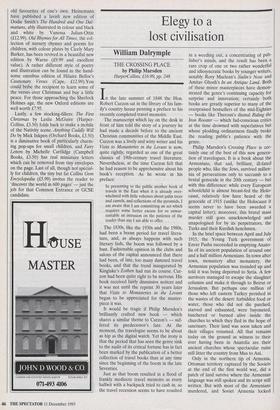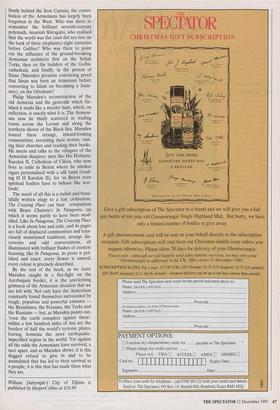Elegy to a lost civilisation
William Dalrymple
THE CROSSING PLACE by Philip Marsden HarperCollins, £16.99, pp. 248 In the late summer of 1848 the Hon. Robert Curzon sat in the library of his fam- ily's country house penning a preface to his recently completed travel memoirs.
The manuscript which lay on the desk in front of him told the story of a journey he had made a decade before to the ancient Christian communities of the Middle East. Curzon was a lively and witty writer and his Visits to Monasteries in the Levant is now, quite rightly, regarded as one of the great classics of 19th-century travel literature. Nevertheless, at the time Curzon felt that he had reason to be apprehensive about his book's reception. As he wrote in his preface:
In presenting to the public another book of travels in the East when it is already over- whelmed with little volumes about palm trees and camels, and reflections of the pyramids, I am aware that I am committing an act which requires some better excuse for so unwar- rantable an intrusion on the patience of the reader than any I am able to offer .. .
The 1830s, like the 1930s and the 1980s, had been a boom period for travel litera- ture, and, as always happens with such literary fads, the boom was followed by a bust. Fashionable opinion in the clubs and salons of the capital announced that there had been, of late, too many damned travel books, and that the trend inaugurated by Kinglake's Eothen had run its course. Cur- zon had been quite right to be nervous. His book received fairly dismissive notices and it was not until the reprint 30 years later that Visits to Monasteries in the Levant began to be appreciated for the master- piece it was.
It would be tragic if Philip Marsden's brilliantly crafted new book — which shares a similar theme to Curzon's — suf- fered its predecessor's fate. At the moment, the travelogue seems to be about as hip as the digital watch. Yet the irony is that the period that has seen the genre sink to the nadir of its critical fortune has in fact been marked by the publication of a better collection of travel books than at any time since the beginning of the boom in the late Seventies.
Just as that boom resulted in a flood of frankly mediocre travel memoirs as every halfwit with a backpack tried to cash in, so the travel recession seems to have resulted
in a weeding out, a concentrating of pub- lisher's minds, and the result has been a rare crop of one or two rather wonderful and idiosyncratic books by younger writers, notably Rory Maclean's Stalin's Nose and Amitav Ghosh's In an Antique Land. Both of these minor masterpieces have demon- strated the genre's continuing capacity for surprise and innovation; certainly both books are greatly superior to many of the overpraised bestsellers of the mid-Eighties — books like Theroux's dismal Riding the Iron Rooster — which fad-conscious critics at the time drowned with superlatives but whose plodding ordinariness finally broke the reading public's patience with the genre.
Philip Marsden's Crossing Place is cer- tainly one of the best of this new genera- tion of travelogues. It is a book about the Armenians, that sad, brilliant, ill-fated people who, like the Jews, survived millen- nia of persecutions only to succumb to a brutal genocide in the 20th century — but with this difference: while every European schoolchild is almost breast-fed the Holo- caust, relatively few have heard of the genocide of 1915 (unlike the Holocaust it seems never to have been awarded a capital letter); moreover, this brutal mass murder still goes unacknowledged and unapologised for by its perpetrators, the Turks and their Kurdish henchmen.
In the brief space between April and July 1915, the Young Turk government of Enver Pasha succeeded in emptying Anato- lia of its ancient population of around one and a half million Armenians. In town after town, monastery after monastery, the Armenian population was rounded up and told it was being deported to Syria. A few survivors managed to escape the slaughter columns and make it through to Beirut or Jerusalem. But perhaps one million of those who left eastern Turkey perished in the wastes of the desert: forbidden food or water, those who did not die parched, starved and exhausted, were bayoneted, butchered or burned alive inside the churches to which they fled in the hope of sanctuary. Their land was soon taken and their villages renamed. All that remains today on the ground as witness to their ever having been in Anatolia are their ancient churches whose spectacular ruins still litter the country from Mus to Ani.
Only in the northern tip of Armenia, Ottoman territory captured by the Soviets at the end of the first world war, did a patch of land survive where the Armenian language was still spoken and its script still written. But with most of the Armenians murdered, and Soviet Armenia locked firmly behind the Iron Curtain, the contri- bution of the Armenians has largely been forgotten in the West. Who was there to remember the brilliant seventh-century polymath, Ananiah Shiragatsi, who realised that the world was flat (and did not rest on the back of three elephants) eight centuries before Galileo? Who was there to point out the influence of the ground-breaking Armenian architects first on the Seljuk Turks, then on the builders of the Gothic cathedrals, and finally, in the person of Sinan (Marsden presents convincing proof that Sinan was born an Armenian before converting to Islam on becoming a Janis- sary), on the Ottomans?
Philip Marsden's reconstruction of the old Armenia and the genocide which fin- ished it reads like a murder hunt, which, on reflection, is exactly what it is. The Armeni- ans now lie thinly scattered in trading towns across the Levant and along the northern shores of the Black Sea. Marsden toured these strange, inward-looking communities, recording their stories, visit- ing their churches and reading their books. He meets and talks to the refugees of the Armenian diaspora: men like His Holiness, Karekin II, Catholicos of Cilicia, who now lives in exile in Beirut where he smokes cigars personalised with a silk band (read- ing H H Karekin II), for 'in Beirut even spiritual leaders have to behave like war- lords'.
The result of all this is a stylish and beau- tifully written elegy to a lost civilisation.
The Crossing Place can bear comparison with Bruce Chatwin's In Patagonia, on which it seems partly to have been mod- elled. Like In Patagonia, The Crossing Place is a book about loss and exile, and its pages are full of displaced communities and tena-
ciously maintained traditions, strange dis- coveries and odd conversations, all illuminated with brilliant flashes of esoteric
learning; like In Patagonia, its prose is pol- ished and exact: every flower is named, every colour is precisely described.
By the end of the book, as we leave Marsden caught in a fire-fight on the Azerbaijani border, it is the unrelenting grimness of the Armenian situation that we are left with. Not only have the Armenians
constantly found themselves surrounded by tough, populous and powerful enemies the Byzantines, the Persians, the Turks and the Russians — but, as Marsden points out, `even the earth conspires against them': within a few hundred miles of Ani are the borders of half the world's tectonic plates. leaving Armenia the most earthquake- imperilled region in the world. Yet against all the odds the Armenians have survived, a race apart, and as Marsden shows, it is this dogged refusal to give in and to be assimilated that has led to their survival as a people; it is this that has made them what they are.
William Daltymple's City of Djinns is published by HaglerCollins at £16.99.



































































 Previous page
Previous page